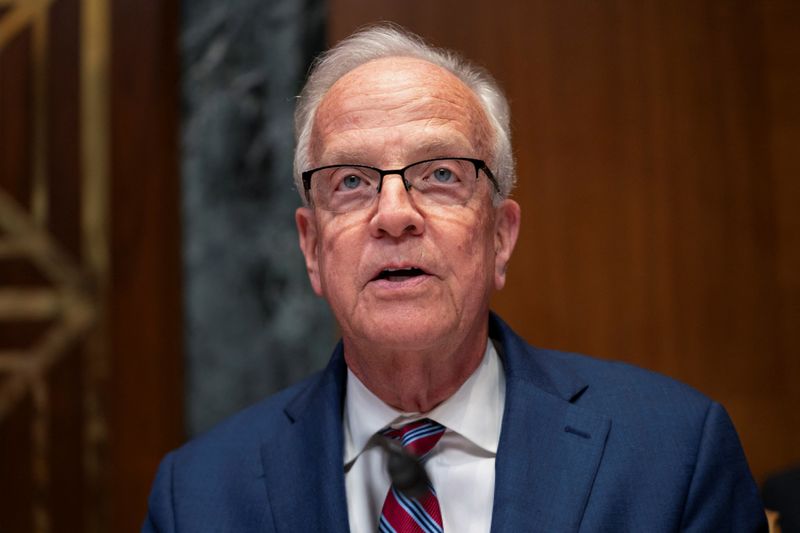By Joey Roulette
WASHINGTON (Reuters) -U.S. Senator Jerry Moran has urged the Federal Aviation Administration to speed up its license review process for private rocket launches, writing in a letter seen by Reuters that the agency's current oversight of a fast-growing space sector is delaying national objectives.
Moran, the highest ranking Republican on the Democratic-controlled Senate Commerce aviation subcommittee, wrote in a letter on Oct. 25 to FAA Administrator Mike Whitaker that the agency's commercial space office "must rapidly improve its transparency, accountability, and pace of execution" in approving rocket launch licenses.
The letter adds to a chorus of industry frustration toward the FAA led in recent months mainly by Elon Musk's SpaceX, with its swift pace of Starship test launches and Falcon 9 flights that has challenged the regulator's ability to oversee the increasingly competitive U.S. space sector.
Musk has stepped up his criticism of the FAA this year as he backs Republican Donald Trump's White House bid hoping the former president can shed what Musk has called "counterproductive" and "needless" U.S. government regulations.
The FAA's Office of Commercial Space Transportation, which regulates private rocket launches to ensure they do not impact the public's safety, has long argued for more funding to grow its licensing team but has struggled to find suitable hires.
Still, in recent weeks the agency has moved faster on approving launches than previously. Earlier this month it greenlit SpaceX's Starship test license a month earlier than anticipated and wrapped up multiple mishap investigations into the company's Falcon 9.
In his letter, Moran said national security missions and NASA's moon program - two areas dominated by SpaceX - are threatened by the FAA's oversight pace.
NASA plans to use SpaceX's Starship rocket in late 2026 to land the first astronauts on the moon since 1972, while the U.S. Space Force relies on SpaceX to launch nearly half of its national security missions to space.
SpaceX rivals promise additional work for the FAA's hamstrung space office.
Jeff Bezos' Blue Origin expects a debut launch of its New Glenn rocket by year's end, while the Boeing (NYSE:BA) and Lockheed Martin-owned United Launch Alliance tries to quicken the launch pace of its new Vulcan rocket. Smaller rockets in development by a handful of U.S. startups are racing to market.

The FAA's space office also faces a looming task to also regulate spacecraft and private astronaut safety, for which no U.S. regulations exist. Industry groups have repeatedly pushed to extend a congressionally set ban on such regulation.
Moran's letter asked how the FAA space office's mission could be helped by spinning it off into its own standalone entity under the Department of Transportation, the FAA's parent agency, an idea some in the industry have supported.